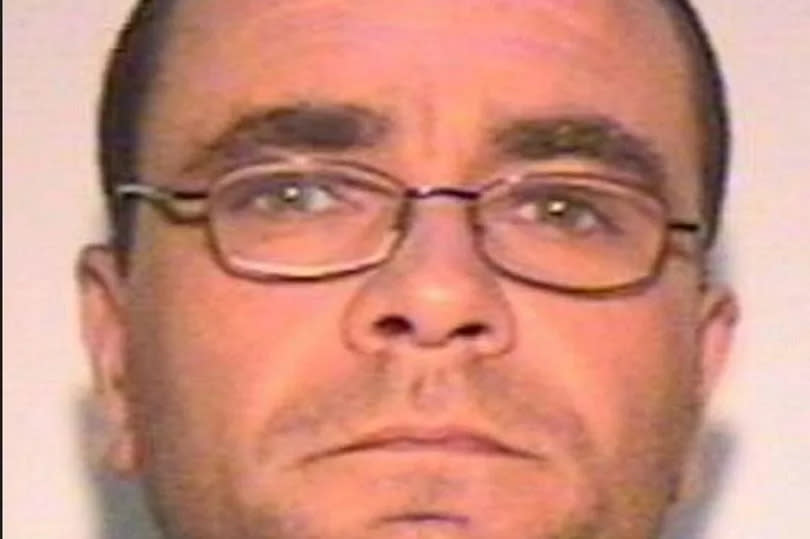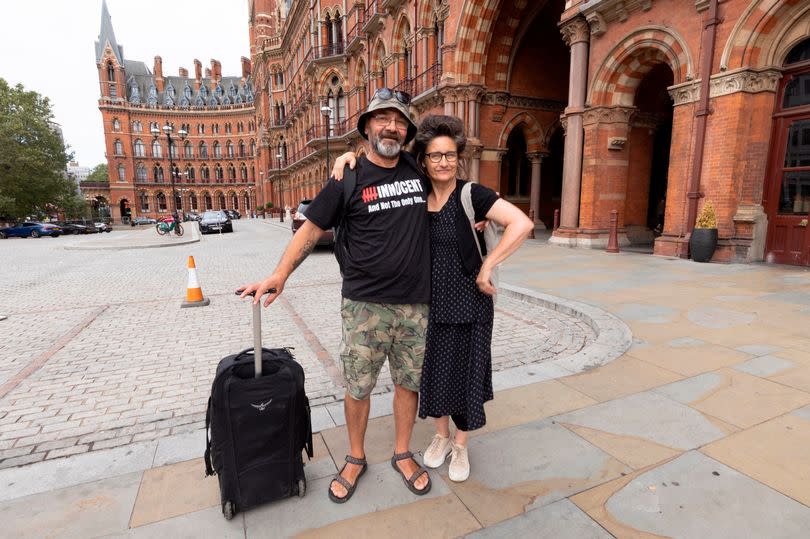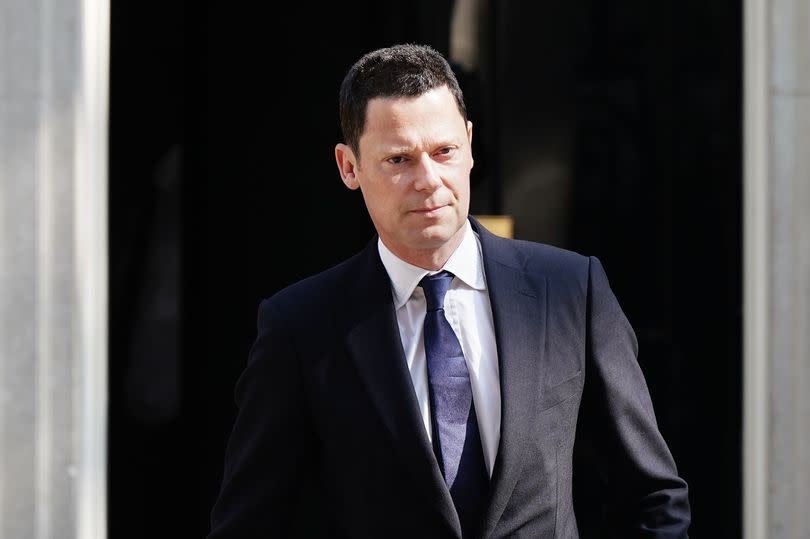'I saw GMP hunt down the wrong man. These haunting questions must be answered now'
Crime stories were a regular part of my job as a district reporter in Salford from 1988 to 2006. But some have stayed with me to this day.
One such case was the harrowing rape of a woman in the early hours of July 19, 2003. The victim, then 33, had left her boyfriend's home in Atherton after an argument, setting off for her home several miles away in Kearsley, Bolton.
On the way, she walked down Armitage Avenue in Little Hulton and a man shouted from bushes: "I suggest you come into the bushes, I have a gun pointing towards you."
She carried on walking, but, at a bridge over the M61 where Cleggs Lane in Little Hulton meets Buckley Lane in Farnworth, she was grabbed by a man who had stalked her for two thirds of a mile. During the violent assault that followed, the woman suffered a fractured cheek bone, an injury to her voice box, and a laceration to her breast.
On the 24th July 2003 I wrote for the MEN: "A mum who was choked, battered unconscious, and then raped by a maniac has told police how she thought she would die".
Twenty years on the victim has never got justice. But failures by Greater Manchester Police (GMP) and the Criminal Cases Review Commission meant an innocent man spent 17 years in jail for the attack.
Having already spent six months on remand, Andrew Malkinson was convicted by a majority of 10 to 2 on February 10th, 2004 at Manchester Crown Court as I watched from the press bench. He was not released until 2020 because, understandably, he refused to say he was guilty. In July 2023, his conviction was quashed by the Court of Appeal.
Is a payment from GMP not the least this man deserves?
He lost so many of his best years to a miscarriage of justice. But, almost a year since his name was cleared, Andrew Malkinson has still not received a penny of compensation and is living on benefits. Surely, after gross incompetence or worse ruined his life, an interim payment from GMP or the Ministry of Justice, pending a huge civil claim, would be the least he deserves?
Also, what will GMP do to discover the root cause of such a disgraceful miscarriage of justice - and will the officers who drove the initial inquiry ever be made accountable?
I took part in a recent documentary, The Wrong Man: 17 Years Behind Bars, broadcast by BBC2, which tracked Mr Malkinson's tale of injustice.
"Ordinary people should be aware that they can be taken. Just taken," he told the programme. He described his experience at the hands of GMP as like being "kidnapped by the State"

In the film Mr Malkinson described his fear of being in prison and the nightmare of having to attend offender behaviour groups in order to be able to apply for parole. He explained how he was meant to discuss his crime, but told prison staff: "I didn't do it, so how can I? Do you want me to lie?" He was told he was in a Catch 22.
The evidence which didn't add up - how could this happen?
Andrew Malkinson was convicted without any DNA evidence linking him to the crime. And two key witnesses - a couple who gave crucial evidence for the prosecution - had 16 convictions for 38 offences between them, including dishonesty.
This was not revealed at the court case in 2004. It was suggested in the documentary they may have had an incentive to give evidence. One of the witnesses, Michael Seward, who was a heroin user, died in 2016.
Mr Malkinson was convicted solely on identification evidence. The 33-year-old victim told Manchester Crown Court she was '100 percent' certain he was her attacker after picking him out on an ID parade. And Mr Seward and his partner also picked him out as the man they saw leaving the scene.
With massive hindsight, discrepancies in the police investigation were evident when I first reported the attack. At the time my information was gleaned directly from officers - unlike today, where GMP's Press Office issues written statements about incidents. The case was being treated as rape and attempted murder and there was an obvious urgency to identify a dangerous man.
The officers told me the victim had remained unconscious for 30 minutes before staggering up the embankment and walking towards Farnworth where she was found by a passer-by who helped her. The attack happened between 4.30am and 5.30am. GMP gave me a description of the rapist provided by the victim.

He was described as 5ft 8in, with a 'body-builder type' physique; in his early to mid 30s. He had a flat stomach and muscles, olive skin, and thick wavy dark brown or black hair. His chest was shiny and hairless. He had a local accent.
Mr Malkinson is 5ft 11in, has chest hair, and is originally from Grimsby. He had been living in the Walkden area for only a short time following moving back to the UK after living abroad.
The embankment where the rape took place is where Little Hulton, a mining village which became a Salford overspill estate, meets the edge of Bolton at Farnworth. Accents in that area vary - from Mancunian to broad Bolton. The victim's evidence that the attacker had a Bolton accent is highly plausible. Mr Malkinson, again, with the benefit of hindsight, didn't sound, or look, like the man police were looking for.
Indeed, decades on, Mr Malkinson's case reads like a reckless pursuit for a result in an episode of Life on Mars. The circumstances of his arrest were bizarre. Ten days after the rape, police issued an e-fit of the suspect based on the victim's description. Two neighbourhood officers in the Little Hulton and Walkden area would stop Mr Malkinson as he rode pillion on an off-road motorbike with the son of a couple he was staying with at the time in Walkden.
The officers thought Mr Malkinson looked like the man in the e-fit and he was later arrested. A judge would later recommend the two beat officers should receive a commendation. As a result of their suspicions Mr Malkinson was held and put in that fateful identity parade. He was then remanded in custody - his freedom lost for nearly two decades, off the back of that moment.

Why was key evidence destroyed?
In 2006, Mr Malkinson's appeal against conviction was dismissed. But the following year there appeared to be a major breakthrough when another male's DNA was found on the victim's vest.
Nonetheless, inexplicably, the Criminal Cases Review Commission (CCRC), the only organisation that can send a case back to the Court of Appeal, rejected his application for appeal. The CCRC did not consider the new DNA evidence to be a strong enough reason to investigate further. In a letter sent from prison to his former partner and best friend Karin following the decision, Mr Malkinson wrote: “It feels like the walls are closing in on me. Crushing me.”
In 2017 Mr Malkinson found what would turn out to be his lifeline - the organisation APPEAL, who took on his case. They requested access to the victim’s clothing in order to carry out further DNA testing, but the police could not find key exhibits in the case.
It turned out GMP had destroyed the victim's vest, knickers, and bra, even though they had a duty to keep evidence for 30 years. Why did this happen and did anyone face disciplinary action for doing so?
By a remarkable slice of luck, APPEAL then discovered samples from the destroyed items from the case, including the vest top, had been retained by a body that was independent of the police. The first set of results confirmed the finding that there was evidence from an unknown male on the victim’s vest top.
GMP announced in December 2022 they had arrested a 48-year-old man in Exeter on suspicion of the rape and he remains on bail under investigation. The Manchester Evening News can reveal that GMP sent a file to the Crown Prosecution Service on the evidence compiled against the new suspect on March 8 this year.
There are concerns about the conduct of officers in this case. Has GMP taken them seriously enough?
Mr Malkinson and APPEAL made a complaint to GMP in July 2022. It was recorded by the GMP's Professional Standards Branch (PSB) and was regarding concerns raised in relation to certain aspects of the historical conduct of the case.
The complaint concerned the GMP decision to destroy clothing which the victim had been wearing - and the failure by GMP to disclose the criminal past of the two key witnesses in the case, a man and a woman who were partners.
GMP's internal Professional Standards Directorate conducted a review and, although it decided the initial investigation fell below expected standards, it did not discover evidence of misconduct by officers.
Mr Malkinson and his supporters appealed GMP's response to the complaint and it has now been referred to the Independent Office for Police Conduct. (IOPC). The IOPC upheld a request by Malkinson to review his application to them, determining that there were “significant issues” with GMP’s conduct of the review. It also said the force did not handle his complaints reasonably or proportionately.
The watchdog will focus on the failure to disclose the criminal past of the key witnesses as well as the destruction of vital evidence, which formed the basis of Malkinson’s complaint.
In a letter to Malkinson, the IOPC says it believes there was “compelling evidence to suggest that there may have been multiple breaches of the standards of professional behaviour by multiple police officers, along with systemic failures by GMP in respect of this case”. They added that it did “not appear that the full scope of the alleged failures have been explored or addressed” within GMP’s investigating officer’s report.
Several officers at the centre of Mr Malkinson's complaint allegations are still working at GMP, one of them in an anti-corruption unit, the IOPC revealed in a letter to his lawyers. The senior officer who oversaw the investigation which resulted in Mr Malkinson being jailed has retired.
Meanwhile the witness Michael Seward not only had multiple criminal convictions, but only came forward as a witness when he was arrested for a crime. As revealed in the documentary he was arrested again on the day he identified Mr Malkinson in a video line up. None of this was disclosed to the court.
Mr Malkinson has claimed this indicates it was possible that GMP officers could have given Seward an incentive to provide dishonest evidence against him.
In response, the IOPC said in the letter to his lawyers that this was “a serious allegation which requires further consideration” and that there was “sufficient and compelling enough evidence to satisfy the view that there was potential for improper motive”.

'Our investigation into GMP's handling of the case continues'
An IOPC spokesperson said: “Our independent investigation into complaints made by Mr Malkinson about Greater Manchester Police’s handling of the investigation that led to his wrongful conviction continues.
“In light of the ongoing criminal matters relating to the crime Mr Malkinson was wrongly accused of, we received requests from GMP and the Crown Prosecution Service to suspend parts of our investigation. Having considered these requests, we have suspended certain lines of inquiry to avoid prejudicing the criminal investigation, or any potential prosecution resulting from it.
“In the meantime, we will continue to follow up other lines of inquiry in the interest of concluding our investigation as soon as reasonably possible. We will continue to keep Mr Malkinson and GMP updated on our progress.”
In October it was announced leading criminal judge, Sarah Munro KC, has been appointed by the Lord Chancellor to chair the public inquiry into the wrongful conviction of Mr Malkinson.
The Inquiry will investigate the handling and role of Greater Manchester Police (GMP), the Crown Prosecution Service (CPS), and the Criminal Cases Review Commission (CCRC) in Mr Malkinson’s conviction and subsequent appeal - to ensure lessons are learned from the significant miscarriage of justice he suffered. All agencies have pledged their full cooperation to the inquiry.
But, as it is a public and not a judicial inquiry, it is not clear whether police officers involved in the initial police investigation which put Mr Malkinson behind bars can be made to attend.
In October last year when the inquiry was announced, Emily Bolton, Mr Malkinson's solicitor, said: "Understandably, Andy has no confidence that the police officers involved in his case will account for their actions unless they are forced to do so. As such, we are calling on the Lord Chancellor to put this inquiry on a statutory basis so that it has the powers needed to get Andy all the answers he deserves."
In response, an Andrew Malkinson Inquiry spokesperson said: "‘The Inquiry is working to fulfil its Terms of Reference that its work should be completed without undue delay. Non-statutory inquiries can hear evidence in either public or private. It will be for the Chair of the Inquiry to determine what is most appropriate for the Inquiry to fulfil its Terms of Reference."
Meanwhile, Judge Munro KC, said she is determined to get to the truth when her position as chair of the inquiry was announced last year.
"Mr Malkinson deserves the truth, and I am determined that this Inquiry will be fearless and robust in seeking that truth and considering what lessons the justice system must learn," she said.
However, if a new suspect is charged that will mean the public inquiry could be delayed.
Why has Andrew Malkinson not had any compensation?
Regarding Mr Malkinson not getting any compensation, the Ministry of Justice said they had yet to receive an application from him.
In a statement the MOJ said: "Mr Malkinson is free to apply to the Miscarriage of Justice Application Service (MOJAS) at any point within the statutory two-year time limit from the date of his conviction being quashed. Neither his application nor any resulting payment, should he meet the statutory test for compensation, would be delayed because of his proposed civil claims."
But the reasons for his delayed application are scandalous in themselves. Mr Malkinson said he had challenged "barriers" put up by lawmakers. These included the situation where deductions would be made from any award to cover board and lodging in prison - this has now been repealed, after a public backlash, when it emerged he would have to pay it after he was released.
He also highlighted how he was faced with a choice between an interim payment now or being allowed legal aid to sue the police later. The government has said it will repeal this too after he raised it.
Mr Malkinson said: "I asked the MOJ to raise the £1m cap on compensation, which has not increased with inflation since it was first introduced in December 2008, but it has so far refused. I have to hope it will reconsider this decision when my application is ready."
Surely the decent thing to do is for the MOJ to make an ex-gratia payment now, pending his civil claim?
What does GMP have to say now?
Assistant Chief Constable for GMP, Sarah Jackson, said: "We remain truly sorry that Mr Malkinson has been the victim of such a grave miscarriage of justice due to the failures of our original investigation.
“We have publicly and directly apologised to both Mr Malkinson and the victim for the mistakes that have already been identified. The matters raised in the BBC documentary are part of the ongoing inquiry that we are fully cooperating with.
“It is beyond doubt that Mr Malkinson did not commit this horrific crime. Our ongoing investigation is committed to ensuring that the true perpetrator is put behind bars so that the victim and all involved can finally have some sense of justice after this awful ordeal.”
GMP say that the issue of the destruction of evidence is a matter for the public inquiry to consider. Asked if officers involved in the investigation which put Mr Malkinson behind bars would give evidence to the inquiry the force said:" This is a matter for the inquiry which we cannot comment on until its conclusion. "
Regarding the progress of the investigation into the new suspect, GMP said: "An initial file was sent to CPS on 8 March and we have been working closely with prosecutors to build the best possible file of evidence."
Asked why GMP destroyed the victim's knickers, vest, and bra, even though there was a duty to keep them for 30 years, the force said: "This is a matter for the inquiry which we cannot comment on until its conclusion."
Asked if an internal investigation was taking place into the conduct of officers involved in the original inquiry the force said: "We did an internal investigation years ago which concluded and the complainant used their right to appeal which had led to the current IOPC investigation."
After losing 17 years of his life, surely the judicial system owes Mr Malkinson the truth - and a rapid resolution of the issue of compensation.

 Yahoo News
Yahoo News 
